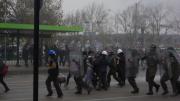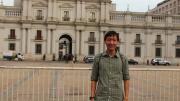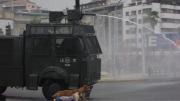There is an ebb and flow to working for a small paper. Due to a lack of universal name recognition or high-ranking contacts, very little news will come in on some days—no one to interview, no local events, no political fights. Other days, we’ll get lucky, and have presidential statements, hunger-strike protests, and international skirmishes to cover. It’s best not to have expectations for how a day will go, and instead to approach every story with the same commitment.
Two particular days have helped me appreciate the variability and unexpected nature of reporting. One morning during my first week on the job at The Santiago Times (a English-language newspaper in Chile’s capital that covers Chilean and Latin American news), I picked up a pitch to go to a press conference the next day concerning homelessness in Chile. I was working on a different article when, an hour later, my editor poked his head into the writers’ room.
“There’s something going on at La Moneda about the homelessness announcement right now,” he said. “You want to run over and see what it’s about?”
His question took me by surprise and made me pretty nervous, but I immediately jumped at the chance. A week before, my group of Harvard undergraduate interns in Chile had visited La Moneda, the presidential palace, marveling at its impressive white façade and the stoic guards in uniform who guarded the entrance. I wouldn’t miss an opportunity to go into the historic building, and then tell my friends nonchalantly, “Oh, I covered a meeting inside La Moneda today.”
Twenty minutes later, I walked up to one of those guards at the front entrance of the building. Instead of standing still, the guard took a step forward and blocked my way. “I’m a member of the press,” I told him in stammered Spanish, and flashed my press pass. To my surprise, he stepped aside at once. I felt invincible. Clearly the press pass had magical powers that could deceive anyone and force even the most dutiful soldiers to surrender.
However, when I got inside and stepped up to reception, my dreams of conquering the presidential palace of Chile were swept away. “The meeting’s already finished,” the receptionist told me with a smirk. The ride back to the office felt quite long, and I had to spend the rest of the afternoon staring at my computer, researching the history of student organizations. The day was quite a letdown, and did nothing to prove my mettle as a journalist.
Quite a different experience lay in store for me nearly a month later. At the beginning of a slow news day, a writer told the group that there was to be a high-school student protest later on. In a preview of the national student strike that was scheduled to take place the following week, high-school students in Santiago were marching to protest profiteering within schools and to demand free education across the board. I picked up the story out of lack of other options. I didn’t expect anything too crazy.
The march was scheduled to start at 11, but my editor said he and I wouldn’t have to go over until 12 or later, to check out the end of the protest, and then I would come back to the office and write up a short brief. We walked over to his apartment around 12:30 to pick up his camera, and arrived at the ending spot of the march a little afterward.
When we arrived at the previously announced end point of the march, we couldn’t see or hear anything significant. It seemed that the protest was over already. But once we got closer, the scene turned from uneventful to grave. A line of Chilean policemen, called carabineros, spanned the boulevard and was advancing swiftly on a group of around 50 students, who stood defiantly together. As the policemen drew near, most of the students scattered. A few bolder ones approached the policemen, and were quickly grabbed and taken behind the riot line and into armored trucks. I had been there for all of 30 seconds, and it already was much more than I had bargained for.
I ducked around the corner of a building and stopped for a second to try to capture the scene in photos. “Andrew,” warned my editor, and I turned to see the police marching in my direction, with less than 10 feet separating me from the line. He and I ran across the street, along with the other retreating students, as well as dozens of photographers who were there to capture the scene. Soon, a couple of trucks drove by blasting water from large cannons, effectively breaking up the last student group and sending everyone in the area running.
It appeared the confrontation was over, but my editor wanted me to stick around, just in case. So I milled around, talking to wet and tired students. As they walked back toward the city center to return to their schools or go home, some began chanting again, and held up flags. As I talked to a couple, I suddenly realized how much younger they were than I was. I headed back to the office and wrote up a report.
That’s the way work goes: sometimes, a big story turns out to be nothing, and a minor event turns out to be one of the most exciting experiences of your life. No two days are the same, and for that reason, it’s been quite easy to get out of bed Monday through Thursday and fight through the fumes and packed Santiago subway cars to get to work.











